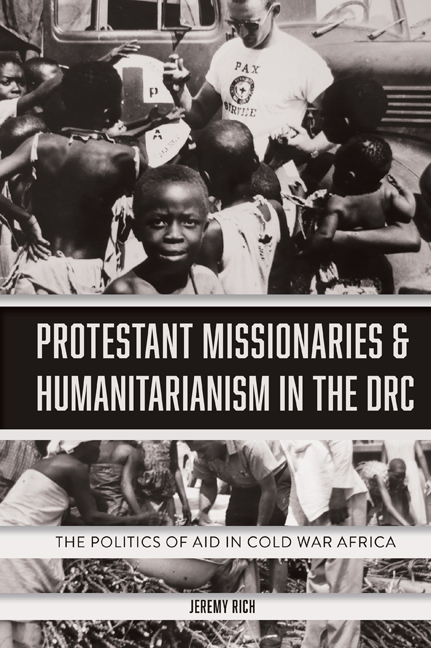Book contents
- Frontmatter
- Contents
- List of Illustrations
- Acknowledgements
- List of Abbreviations
- Introduction
- 1 The CPRA, Protestant Missions, and the Congo Crises, 1960–1965
- 2 The CPRA and Luba Refugees in South Kasai, 1960–1962
- 3 The CPRA and Angolan Refugees in the DRC, 1961–1967
- 4 The CPRA and the Simba Revolts, 1964–1967
- 5 Operation Doctor: The Rise and Fall of a Protestant Short-Term Medical Volunteer Programme
- 6 Protestant Volunteers and Medical Practice in the Congo in the 1960s
- 7 Changing Dollars into Zaires: The Challenges of a Humanitarian Aid NGO in the DRC, 1965–1973
- 8 The Centre for Community Development
- Conclusion
- Bibliography
- Index
6 - Protestant Volunteers and Medical Practice in the Congo in the 1960s
Published online by Cambridge University Press: 11 September 2020
- Frontmatter
- Contents
- List of Illustrations
- Acknowledgements
- List of Abbreviations
- Introduction
- 1 The CPRA, Protestant Missions, and the Congo Crises, 1960–1965
- 2 The CPRA and Luba Refugees in South Kasai, 1960–1962
- 3 The CPRA and Angolan Refugees in the DRC, 1961–1967
- 4 The CPRA and the Simba Revolts, 1964–1967
- 5 Operation Doctor: The Rise and Fall of a Protestant Short-Term Medical Volunteer Programme
- 6 Protestant Volunteers and Medical Practice in the Congo in the 1960s
- 7 Changing Dollars into Zaires: The Challenges of a Humanitarian Aid NGO in the DRC, 1965–1973
- 8 The Centre for Community Development
- Conclusion
- Bibliography
- Index
Summary
Jim Stough could never forget his first day as a CPRA volunteer doctor in 1962. He had agreed to serve with his wife for two years at Tandala, a rural mission hospital in Equateur province. His first patient was a woman trying with difficulty to deliver her child. Preparing to conduct a cesarean section, Stough performed spinal anesthesia, but had done so too high on the spinal column. He said to his nurses, ‘Her diaphragm is paralyzed. We got to hook her up to the anesthesia machine.’ Their answer was a reminder he was far from his practice in Illinois: ‘Well, we don't have an anesthesia machine.’ Stough then told them to infibulate the patient and use a bag valve mask to manually respirate her. There were no masks at the station. ‘If I can't sustain her breathing, she's going to die,’ Stough said. The nurses agreed. To add to Stough's consternation, he and his nurses were not alone. A crowd had formed to watch the new doctor through the operating room's windows. The woman's husband sat at the foot of the operating table as his wife died, even as the baby survived. Stough left the room and told his wife, ‘This isn't for me. We’re leaving as soon as we can get out of here.’ Instead, someone called him back to perform surgery on a patient with an incarcerated strangulated hernia. He returned to duty.
Stough's improvisations illustrate the challenges for Congolese and volunteers in the Operation Doctor programme. North American doctors had come from what historian James Burham has called the ‘golden age’ of medicine in the 1950s and early 1960s. Technological breakthroughs helped ensure public confidence in medical professionals, who increasingly worked within a bureaucratic public health structure that emphasised specialisation. If medical care under Belgian rule articulated colonial anxieties, independence had left the position of medical missionaries – particularly volunteers – imbued with insecurities: technical, political, and psychological.
We do not know what the Congolese spectators thought of Stough's vain scramble to keep his patient alive. Yet it is clear the authority of missionaries under Belgian rule could no longer be taken for granted. The paternal missionary order backed by the colonial state had frayed. Individual volunteers could be threatened by government soldiers and rebels. Volunteers usually lacked the linguistic and cultural competence to effectively communicate with Congolese stakeholders.
- Type
- Chapter
- Information
- Protestant Missionaries and Humanitarianism in the DRCThe Politics of Aid in Cold War Africa, pp. 155 - 179Publisher: Boydell & BrewerPrint publication year: 2020



